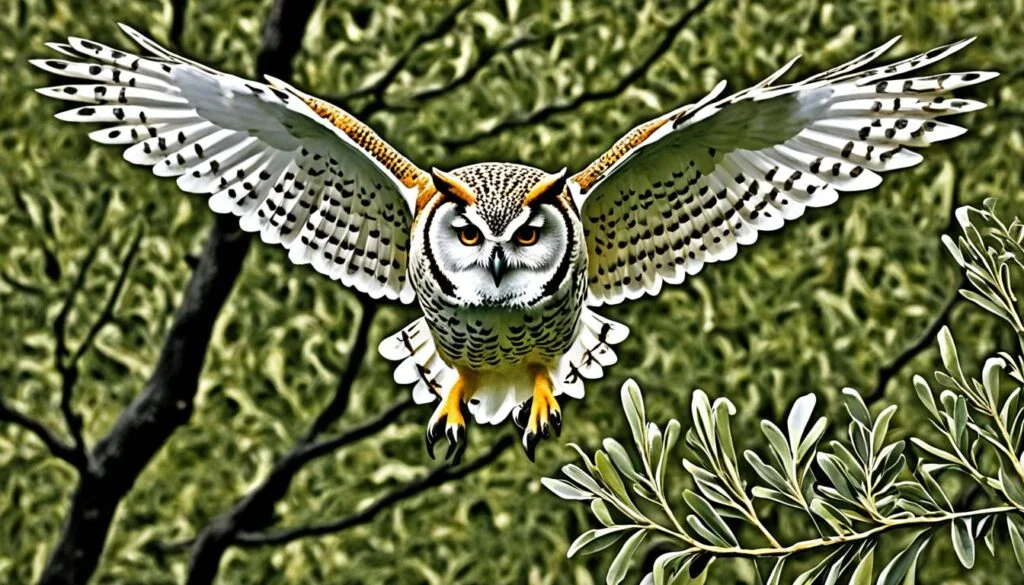The owl has been fascinating people since ancient times, especially in ancient Greek tales.
Known for flying silently at night, Athena’s owl was a symbol of wisdom and safety. I
n Greek history, the owl could represent a wise protector or the goddess Athena’s alertness.
From about 480-420 BC, the silver tetradrachm coin showed the owl as special on one side.
This coin is now on display, like at the Museum of Fine Arts of Lyon. The owl wasn’t just a pretty picture; it stood for intelligence and planning.
This became more important after the Greeks beat the Persians in 479 BC. The Athenian drachma, called ‘glaukes’ or ‘little owls,’ integrated this important meaning into everyday life.
Ancient Greek artifacts, such as vases and coins, showed owls as protectors and as symbols of Athena’s careful watch.
The connection with Athena and the widespread use of owls in Greek art highlight their deep importance.
Key Takeaways
- Owls are a potent symbol in Greek mythology, associated closely with Athena.
- Artifacts dating back to 480-420 BC often depict the owl as a sacred animal.
- The significance of owls in Greek mythology is reinforced by their presence in art and currency.
- Athenian drachmas featuring owls signified wisdom and protection post-Greek victories.
- Owls’ cultural and symbolic roles continue to be recognized in modern times.
The Owl of Athena: Symbol of Wisdom
The *Owl of Athena* is a famous symbol of knowledge and wisdom in Greek culture. Athena, the goddess, is often linked with the “Owl of Athena.”
This connection has deep historical and cultural meaning.
The Little Owl (Athene noctua)
*Athene noctua*, or the little owl, is about 22cm long. This small owl is known for its sharp senses.
It was closely tied to Athena because of its presence in Athens.
In the early 5th century B.C., Athens honored Athena on its coins with an owl. These coins were called ‘glaukes’ or ‘owls’, showing Athena’s connection to wisdom.
This also reflected on Athens, known for its intellectuals.
Association with Goddess Athena
The importance of owls to Athena came from their excellent vision. They symbolize Athena’s wisdom and her watching over Athens.
The owl’s sound, too, highlighted Athena’s protective role.
At the University of Texas, the “Owl of Athena” in a sculpture marks ancient values.
This symbol shows the importance of knowledge today. It mixes Greek myths with Texan symbols, showing the value of intelligence and wisdom.
The owl represents wisdom and judgment guiding students in achieving excellence.
Origins of Owl Symbolism in Ancient Greece
The origin of owl symbolism in ancient Greece has many roots. It includes Minoan culture and the wider Indo-European influence.
Owls were often linked to wisdom and mystery in Greek culture.
Minoan and Indo-European Influences
Owl symbolism began with the Minoan civilization. It is believed a bird-related Minoan goddess started it, later merging with the Greek goddess Athena.
Indo-European influences also played a part, crafting the owl’s special meaning in Greek myths.
Athens, tied to Athena, had many owls nearby. This highlighted the bird’s role in daily life and rituals.
During the Battle of Salamis, Athena’s favor through owls was witnessed, strengthening their divine link. For more details, read further on the source of owl symbolism.
Characteristics of Owls that Symbolize Wisdom
Owls naturally portray wisdom through their unique features. Their nighttime hunting, silent flight, and sharp sight indicate deep knowledge and insight.
These traits matched well with the wisdom Athena represented.
Philosophers such as Aristotle and Hegel saw owls as symbols of wisdom. Athenian coins showed the goddess with an owl, celebrating their joint meaning of wisdom and protection.
You can learn more about this in deep Indo-European myths.
What Did Owls Represent in Greek Mythology
In Greek mythology, owls were more than symbols of wisdom. They stood for various ideas such as strategy, hidden knowledge, and divine shield.
The Owl of Athena, a little owl known as Athene noctua, played a big role in ancient stories. This owl, only 8.5 inches (22 cm) long, was very common in old Athens.
Its presence was vital in the culture and religion of that era.
The Owl of Athena brought luck in important moments. For instance, it was linked to the victory in the Battle of Salamis.
It wasn’t just a sacred bird; it was considered a bringer of fate and wise advice. When Athens started using silver coins, they put the owl of Athena on them.
This showed how the owl was valued in their society.
Owls were seen positively in various cultures. Both Native Americans and Greeks praised them for their intelligence and future-seeing abilities.
This differs from how owls were viewed in some places as signs of bad luck and darkness. The owl was often connected to people who could predict the future.
Even famous philosophers like Aristotle and G.W.F. Hegel recognized the owl’s deep meaning.
Hegel said, “The owl of Minerva spreads its wings only with the falling of the dusk.” He meant that understanding comes too late, after the events have passed.
This idea of owls being tied to hidden wisdom continued even after the ancient times.
Significance of Owls in Greek Myths
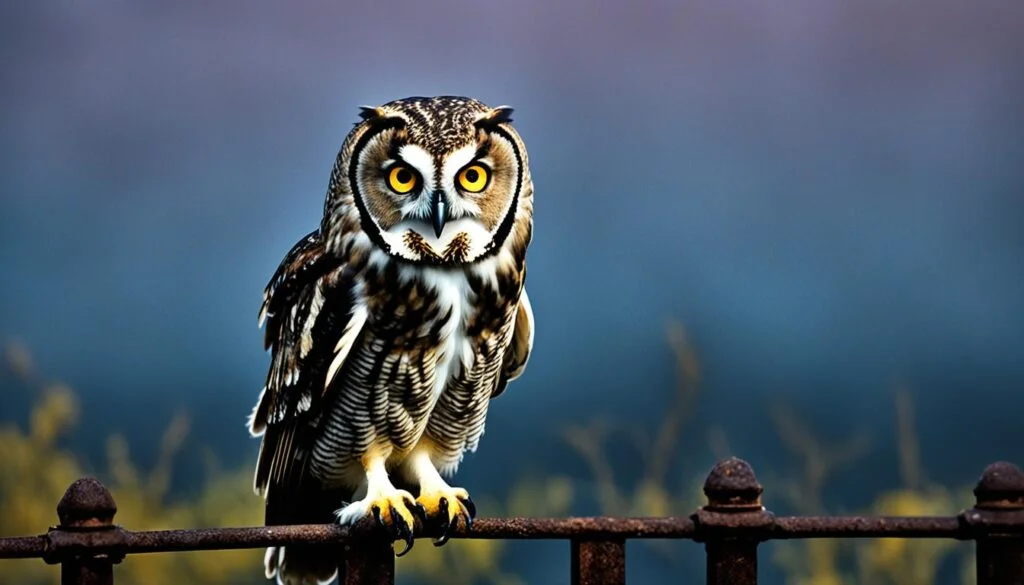
In Greek myths, owls were more than just birds. They were symbols of deep truths and wisdom.
People saw them as signs, especially in key battles, hinting at whether one side would win.
Owls as Omens in Battles
Owls showed up at important moments in Athenian history. At the Battle of Salamis, seeing an owl meant victory to the Greeks.
This reinforced the idea that owls were more than just birds. They were thought to bring messages from the gods.
The Role of Owls in Greek Legends and Stories
Owls were stars not just in war but in stories too, like those of Athena, the goddess of wisdom. She used owls to carry her messages.
This role as Athena’s messenger made owls stand for wisdom and guidance in ancient myths.
The people of Athens respected owls so much they put them on their coins. The Athenian coin called “glaux” showed an owl.
This highlighted how important owls were. They were central in Athenian life and its beliefs.
Owl Symbolism in Ancient Greece
Owls had a key role in ancient Greece because of Athena. She was the goddess of wisdom and strategic thinking. Athenian coins featured owls, which showed the city’s values. These coins were very important in trade and society.
Owls on Athenian Tetradrachms
The owl on Athenian coins wasn’t just a decoration. It was a sign of Athena’s wisdom and care.
These coins, called glaukes, appeared after Greece won over Persia in 479 BC. They spread far and wide, symbolizing Athens’ success and Athena’s wisdom.
This made the owl an important symbol of Athens.
Athenian Glaukes (Owls) Coins
The owls on these coins meant more than just money. In wars, they were thought to bring Athena’s help to soldiers.
For example, they might have given courage to Agathocles of Syracuse in 310 BC against the Carthaginians.
The Romans also used owl symbols for their goddess, Minerva, showing the owl’s lasting meaning.
Greek Beliefs About Owls
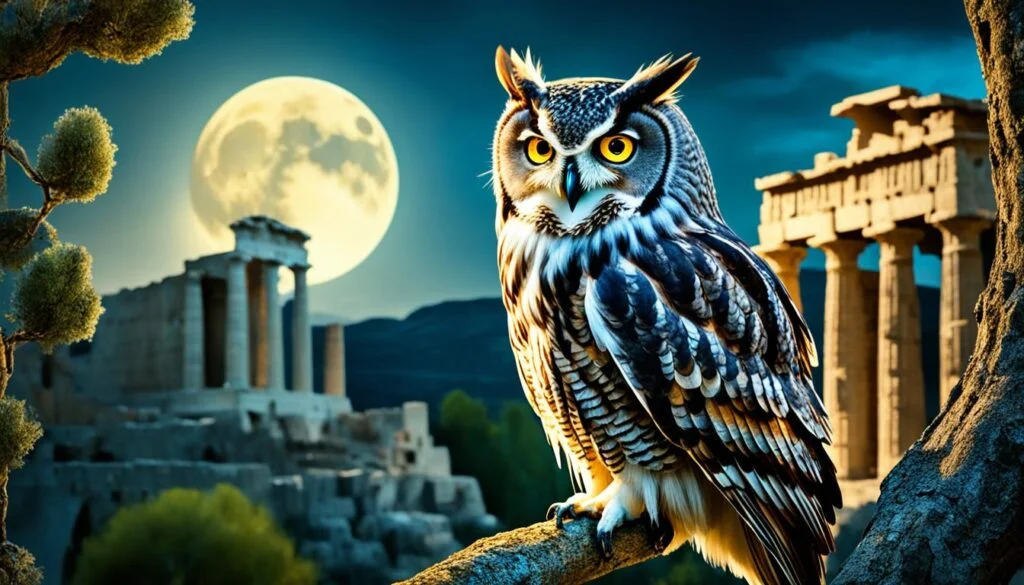
Greeks saw owls in deep, complex ways, mixing respect and fear. They viewed these birds as both wise guards and bearers of darkness.
Owls were tied closely to the goddess Athena. This made the Greeks think of them as symbols of wisdom and foretelling.
But some thought owls were bad omens. Their calls at night caused worry, with some linking them to death.
People in Roman times were especially afraid of owl sounds. Yet, the general feeling was positive. Greeks saw owls as signs of wisdom and future insights.
Owls also appeared on important Greek coins, like the Athenian tetradrachm. This showed their significance in Athens.
They were seen as both smart protectors and eerie nighttime beasts. Historian Pliny wrote that owls were ‘monsters of the night’.
This shows their mixed reputation as both wise and possibly bringers of misfortune.
Owl Representations in Greek Folklore
In Greek folklore, the owl was a deep mythological symbol, representing wisdom.
These creatures were not just animals; they were key figures in stories and art.
The owl’s role in Greek culture showed its ability to see what’s hidden and share truths.
Mythical and Cultural Depictions of Owls
The Little Owl, also known as Athene Noctua, was often with Athena. It stood for wisdom and was shown in many Greek artifacts.
Owls weren’t just symbols; they were seen as sources of knowledge and inspiration.
Owls on the Acropolis in Athens underscore their importance in ancient times.
They were thought to have special sight, able to see the truth beyond what was in front of them.
Their keen eyes and unique anatomy let them see with a clarity that was linked to Athena’s wisdom.
Today, iUniversity Prep’s students see owls as a symbol of wisdom and direction. This view matches the historical one, showing that owls still stand for learning and deep understanding.
The owl’s meaning as a bringer of light and vision carries over into the modern day.
Owls are both hunters and protectors, showing they’re strong and watchful.
They hunt well, see great in the dark, and are good at adapting. They also courageously protect their young, making them symbols of vigilance and power.
Owls have always been linked to wisdom and truth. This connection is seen in ancient Greek art and still in use today.
The owl’s symbolic role connects the past with our current understanding. This deepens our appreciation of the owl’s place in owl folklore.
Significance of Owls in Greek Religion
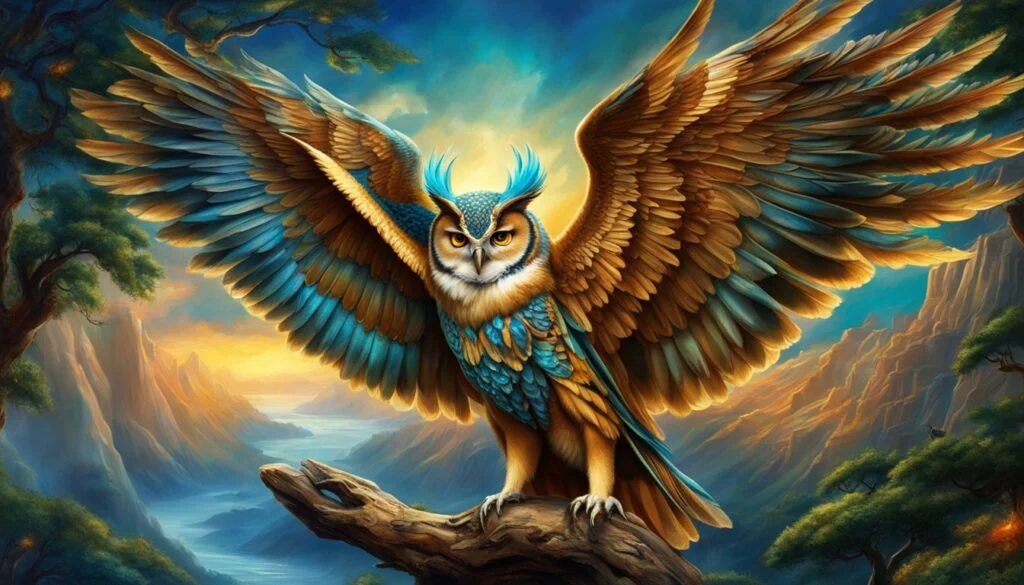
In ancient Greek times, owls were very important. They were closely tied to Greek faith and worship.
Owls were seen as special to Athena, the goddess of wisdom. Because of this, they became symbols of wisdom and protection.
Wise Athena often had owls by her side in paintings. This showed they were all about telling the truth and knowing a lot.
Owls were not just seen in paintings. They were also part of important religious spots and ceremonies.
Owls acted as messengers from humans to gods, making them mystical. This link made owls key in Greek faith.
They weren’t just birds. They were seen as carriers of Athena’s own wisdom and knowledge.
Because of their link to Athena, owls were highly valued in Greek faith. People deeply respected these birds.
They honored them as symbols of Athena’s wisdom. Owls were at the heart of Greek religious celebrations and offerings, highlighting their sacred status.
Owl Symbolism in Mythology
Owls have been in myths for a long time. Different cultures have their own views of these mysterious birds.
In ancient Greece and among Native American tribes, owls symbolize wisdom, prophecy, and the world of spirits.
Philosophical Metaphors Involving Owls
In philosophy, owls are powerful symbols. They show the depth of our understanding. Aristotle compared bats’ eyes to our minds.
He said both can only see a bit of reality until they’re lit up by knowledge.
Hegel’s Metaphor “The Owl of Minerva”
Hegel made a famous metaphor with an owl, the owl of Minerva. It means we often understand things only after they’ve happened.
Philosophy, to Hegel, can really see an era’s truth as it becomes the past. This shows that true wisdom often comes too late.
The owl has been a source of many cultural beliefs. The Romans thought an owl’s hoot meant death was near.
But Native American tribes saw it as a guide between our world and the spirits’. Every culture that sees the owl as special adds to its deep symbolism.
Athena and Her Owl: A Special Relationship
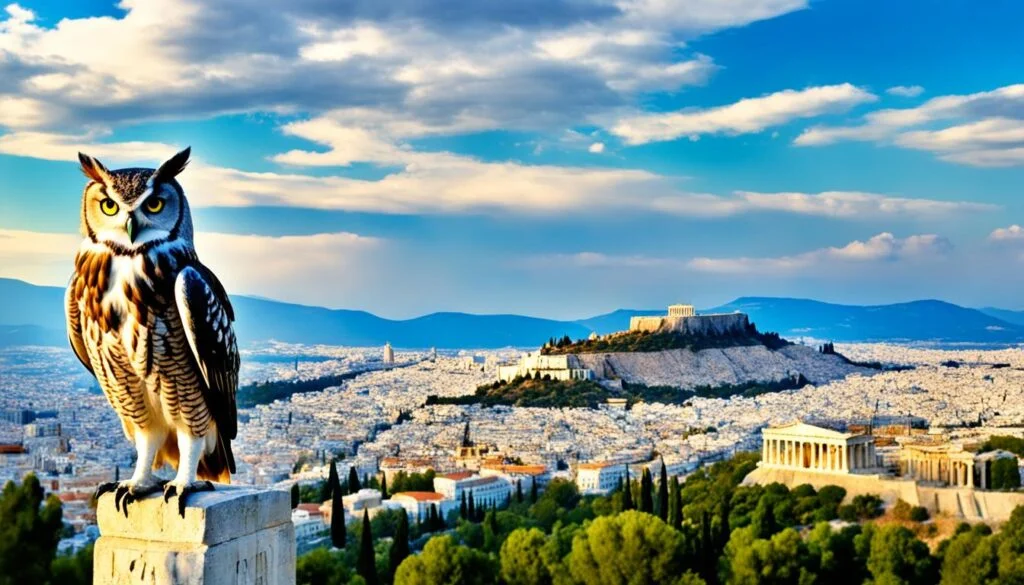
Athena is closely tied to the city of Athens through its culture and religion. She’s often linked with the owl, a symbol of wisdom and smart battle strategies.
The owl was so important in Athens that it appeared in many temple decorations.
Athena is often shown with an owl, which highlights her watchfulness and cleverness.
This connection was viewed as a sign that she was looking out for the city’s people, especially when they succeeded in battles.
The owl’s role was not just local; it even affected how Rome saw Minerva, underlining the owl’s status as a symbol of intelligence.
Athena as the Patron of Athens
Athena was not just any goddess to Athens; she was seen as their protector. This belief was strong enough to feature in the city’s most important building, the Parthenon.
She is praised for her smart and practical approach, traits that the owl also stands for.
Representation of Owls in Athenian Temples
In Athenian temples, images of Athena and her owl were everywhere. They reminded everyone of Athena’s care and wisdom.
These depictions made Athena’s link with Athens, and the protective owl symbol, very central to the city’s identity.
Owl Meanings in Ancient Greek Culture
In ancient Greek times, the owl meant a lot. It linked nature, gods, and people. The owl cultural significance comes from Athena, the wise goddess.
She was the guardian of Athens. Owls were symbols of protection, bringing blessings and ensuring safety.
They meant more than just animals. Owls represented wisdom that lasts forever.
Owls also stood for being alone and keeping secrets in Greek culture. They were mysterious, making people feel amazed and thoughtful.
Their quiet, watchful ways made them important in art and stories. In war, seeing an owl was good luck before a battle.
In thoughts and learning, owls were always remembered.
Today, people still love owls in lots of ways. They are in stories, art, and jewelry. Sirioti Jewelry makes silver pieces based on Greek owls.
These pieces mix old art and ancient Greek symbolism. They keep the owl’s magical meanings alive and well.
The Spread of Owl Symbolism Beyond Greece
Owl symbols went far beyond Ancient Greece into various cultures. Seen as a sign of wisdom, it moved into Roman culture.
There, they linked it to Minerva, the goddess related to wisdom. This journey shows how symbols change but stay meaningful over time and different groups.
Roman Adaptation: Minerva’s Owl
Minerva’s owl in Rome kept its original wise status from Athena’s owl in Greece. It was seen as a sign of being smart, planning, and seeing ahead.
This link to Minerva showed that wise owl meanings lasted through the changes in Mediterranean regions.
Romans put Minerva’s owl on their coins, just like the Greeks did, connecting to wisdom and knowledge.
The owl in Roman art and buildings also picked up from Greek ideas. This shared tradition showed the strong connection between Greek and Roman ways.
The Romans’ use of the owl proves it was a global symbol of deep meaning. It also demonstrates the lasting power of symbols through different cultures and times.
Owls in Modern Interpretations
The owl’s symbolic meaning has moved from ancient tales to now, where it stands for wisdom. It connects today’s culture with myths of old. This shift shows the owl as a timeless symbol of insight.
Owls have held many meanings over time. From ancient India, where they symbolized wisdom, to Rome’s belief that their hoots foretold death, their journey is rich.
In modern times, they still represent mystery, cleverness, and freedom, seen in books, logos, and brand designs.
Current Symbolic Meanings of Owls
Owls today symbolize many things. American Indian tribes like the Apache, Cherokee, and Cree saw them as protectors and guides to the spirit world.
The Kwagulth in the Northwest felt they communicated with the deceased. This shows the owl’s tie to relationships between life and death.
Owls are now seen as:
- Wisdom: They are connected with wisdom, a trait shown by historical figures like Athena.
- Intelligence: Their special skills, like night vision and silent flight, represent smart thinking.
- Independence: They are known for living alone, reflecting being self-reliant and free.
This view continues the owl’s status as a wisdom symbol. It blends respect from the past with current ideas.
The owl remains a strong symbol of knowledge and insight, adding to human culture.
Conclusion
Owls hold a special place in history and legend, influencing us for thousands of years.
In ancient Athens, they symbolized Athena’s watchful protection. As such, they were highly respected and often included in Greek artworks.
Owls continue to symbolize wisdom in our modern world. They are found in many books, movies, and pieces of art.
Even in contemporary jewelry, like at Sirioti Jewelry, the owl’s wisdom is celebrated. This includes teachings by philosophers such as Aristotle and Hegel.
The Romans also recognized the owl’s connection to wisdom, using it to represent Minerva. An owl’s meaning goes beyond just one culture.
They stand for not only wisdom but also foresight, linking our world to the spiritual realm.
The owl’s role in esoteric beliefs and magic reflects its deep, mystical nature. Their symbolic importance stretches far and wide, touching different cultures.
Owls are more than birds; they are keepers of knowledge and mystique, fascinating and guiding us through time.


